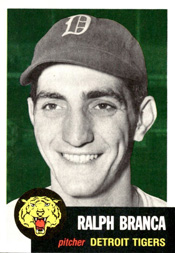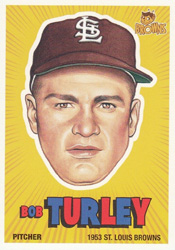The last home win in St. Louis for the Browns featured two pitchers _ one on the way up; the other on the way down _ who played prominent roles in 1950s baseball lore.
 Ralph Branca of the Detroit Tigers and Bob Turley of the Browns engaged in a classic duel at St. Louis on Sept. 5, 1953. Each went the distance in a game the Browns won, 1-0, in 12 innings.
Ralph Branca of the Detroit Tigers and Bob Turley of the Browns engaged in a classic duel at St. Louis on Sept. 5, 1953. Each went the distance in a game the Browns won, 1-0, in 12 innings.
Branca, the Brooklyn Dodgers reject, nearly held the Browns hitless the first nine innings. Turley, a rookie, overpowered the Tigers with a fastball that was perhaps the best in the American League.
As Bob Burnes of the St. Louis Globe-Democrat noted, “This was one of the year’s best ballgames anyplace.”
Witnessed before a mere 1,960 spectators on a Saturday night, it turned out to be the last time the Browns won at home. Three weeks later, the franchise was moved to Baltimore and renamed the Orioles.
Something to prove
Branca was 18 when he debuted with the Dodgers in 1944. He earned 21 wins for them in 1947 and came close to pitching two no-hitters against the St. Louis Cardinals that season.
His good work got obscured by the pennant-clinching home run he gave up to Bobby Thomson of the New York Giants at the Polo Grounds in 1951.
The next time Branca pitched at the Polo Grounds, he allowed six runs, including a Hank Thompson grand slam, in one inning of work on July 5, 1953. Boxscore
A week later, with his ERA for the season at 9.82, the Dodgers placed Branca on waivers. Every team in the National League, including the Cardinals, declined to claim him. The American League Tigers decided to take a chance.
“I see no reason why he can’t be a big winner for us,” Tigers manager Fred Hutchinson said to the Associated Press. “He’s an intelligent, levelheaded fellow who seems to have all the equipment of a good pitcher.”
In his Tigers debut, against the Browns at Detroit, Branca gave up a home run to the first batter he faced, Johnny Groth. Before the inning was over, Vic Wertz also connected against Branca for a two-run homer. Branca settled down after that and held the Browns scoreless for four innings but was the losing pitcher. Boxscore
Branca got a complete-game win in his next start versus the Athletics. “When the result was announced over the Ebbets Field loudspeaker (in Brooklyn), the jammed stands cheered long and loud,” the New York Daily News reported. Boxscore
Two months later, as he approached his start against the Browns at St. Louis, Branca was 3-4 with a 4.63 ERA with the Tigers.
Local prospect
Bob Turley went to Central High School in East St. Louis, Ill. “He had been a good sandlot pitcher but he wasn’t sensational,” the St. Louis Post-Dispatch noted.
 Browns chief scout Jack Fournier, a former Cardinals first baseman, thought otherwise. In the book “We Played the Game,” Turley said, “Fournier had discovered me pitching in a municipal league in East St. Louis in 1948 and asked me to take the nickel bus ride across the river to try out at Sportsman’s Park.”
Browns chief scout Jack Fournier, a former Cardinals first baseman, thought otherwise. In the book “We Played the Game,” Turley said, “Fournier had discovered me pitching in a municipal league in East St. Louis in 1948 and asked me to take the nickel bus ride across the river to try out at Sportsman’s Park.”
The Browns signed Turley, 17, on the night he graduated from high school and sent him to the Belleville (Ill.) Stags, their Class D farm club. “Belleville wasn’t pitching him at first, so we almost had to fire the manager in order to get them to let Turley pitch,” Browns general manager Bill DeWitt Sr. recalled to the Post-Dispatch.
Turley was 23-5 for the Class C Aberdeen (S.D.) Pheasants in 1949 and 20-8 for the Class AA San Antonio Missions in 1951. San Antonio manager Jo-Jo White, a former big-league outfielder, told the Post-Dispatch, “Turley has everything _ a good fastball, two of the meanest curves I’ve ever seen, the strength to pitch all day, and nerve.”
Turley, 21, got called up to the Browns in September 1951 and made one appearance, a start at home against the White Sox, and lost on a Saturday afternoon before 1,014 fans. “Almost everybody in the stands was my family,” Turley told author Danny Peary. “I got the loss but it was still a real thrill.” Boxscore
A month later, Turley began a two-year hitch in the Army. When he rejoined the Browns in August 1953, he and Harry Brecheen became road roommates. Turley was 22. Brecheen, the former Cardinals pitcher who joined the Browns for his final season, was 38.
In the book “We Played the Game,” Turley recalled, “When I was 11, a team I was on played a three-inning game in Sportsman’s Park before the Cardinals’ game. Our manager gave each of us baseballs for autographing and I asked Harry to sign my ball. He was pitching that day and said he didn’t have time. When we roomed together, you bet your life I reminded him of that day.
“I liked Harry. He was a funny guy with a dry sense of humor and a lot of common sense. He taught me pitching fundamentals, which was important because in those days there weren’t pitching coaches to help us develop.”
On Aug. 31, 1953, Turley, 22, relieved starter Satchel Paige, 47, in the sixth inning against the Washington Senators. Turley hit a home run against Sonny Dixon, but gave up the winning run and took the loss. Boxscore
Turley’s next appearance came in the start versus Ralph Branca and the Tigers.
Pair of aces
It was evident from the start of the game that both Branca and Turley were sharp.
Branca retired the first 12 batters he faced before Vic Wertz opened the fifth with a walk. The first hit he allowed came in the sixth, an infield single by Johnny Groth off the glove of second baseman Fred Hatfield. Branca told The Sporting News, “Hatfield could have thrown out Groth if he had come up with the ball.”
Groth’s single was the Browns’ only hit against Branca in the first nine innings.
Turley was tough, too, striking out 10 Tigers in the first six innings.
Both pitchers took shutouts into the 12th. In the bottom half of the inning, Dick Kokos ended the drama with a home run onto the pavilion roof in right.
Turley allowed three hits, walked four and struck out 14. Branca gave up four hits, walked one and fanned eight. Boxscore
The win gave the Browns a season record of 48-88, which was one reason the Saturday night game attracted fewer than 2,000 spectators. In “We Played the Game,” Turley said, “It wasn’t depressing playing in front of empty stands in St. Louis. I was a rookie pitcher and wasn’t looking into the stands. I just wanted to play baseball and improve.”
Different paths
The next day, the Tigers won, 5-2, at St. Louis. Then the Browns embarked on a 14-game road trip and went 6-8. They returned to St. Louis to close out the season with a three-game series against the White Sox. The Browns lost all three. The finale, played on Sept. 27, 1953, before 3,174 customers, went 11 innings. Boxscore
Two days later, American League owners approved the move of the Browns from St. Louis to Baltimore after club owner Bill Veeck agreed to sell his controlling interest to a group led by attorney Clarence Miles for $2.5 million.
Branca and Turley took different career paths in 1954. Branca had a 5.76 ERA in 17 games when the Tigers released him in July. After brief stints with the Yankees and Dodgers, he was done pitching at 30 in 1956.
Turley emerged as a force in the American League with the 1954 Orioles. Though he walked more batters (181) than any pitcher in the league, Turley also struck out the most (185) and had 14 wins for a team that totaled 54.
“He’ll be the next to strike out 300 in a season,” Cleveland Indians fireballer Bob Feller predicted to the Post-Dispatch.
Yankees manager Casey Stengel told the newspaper, “He’s the fastest in our league, I’ll guarantee that. Maybe he’s the fastest in baseball. Turley has a great future. He could be a 30-game winner when he reaches his peak.”
After the 1954 season, Turley, along with pitcher Don Larsen, was traded to the Yankees. He told author Danny Peary it was “the greatest day of my life” because it gave him a chance to pitch for a contender.
In 1958, Turley (21-7, 2.97 ERA) won the Cy Young Award and was named most valuable player of the World Series. In Game 5 against the Braves, he pitched a five-hit shutout and struck out 10, including Hank Aaron twice. In the decisive Game 7, he relieved Larsen in the third, held the Braves to a run in 6.2 innings and got the win. Boxscore
Turley pitched in five World Series for the Yankees and won four times.
He and Branca finished with somewhat similar records in the big leagues. Branca: 88-68, 3.79 ERA. Turley: 101-85, 3.69.
